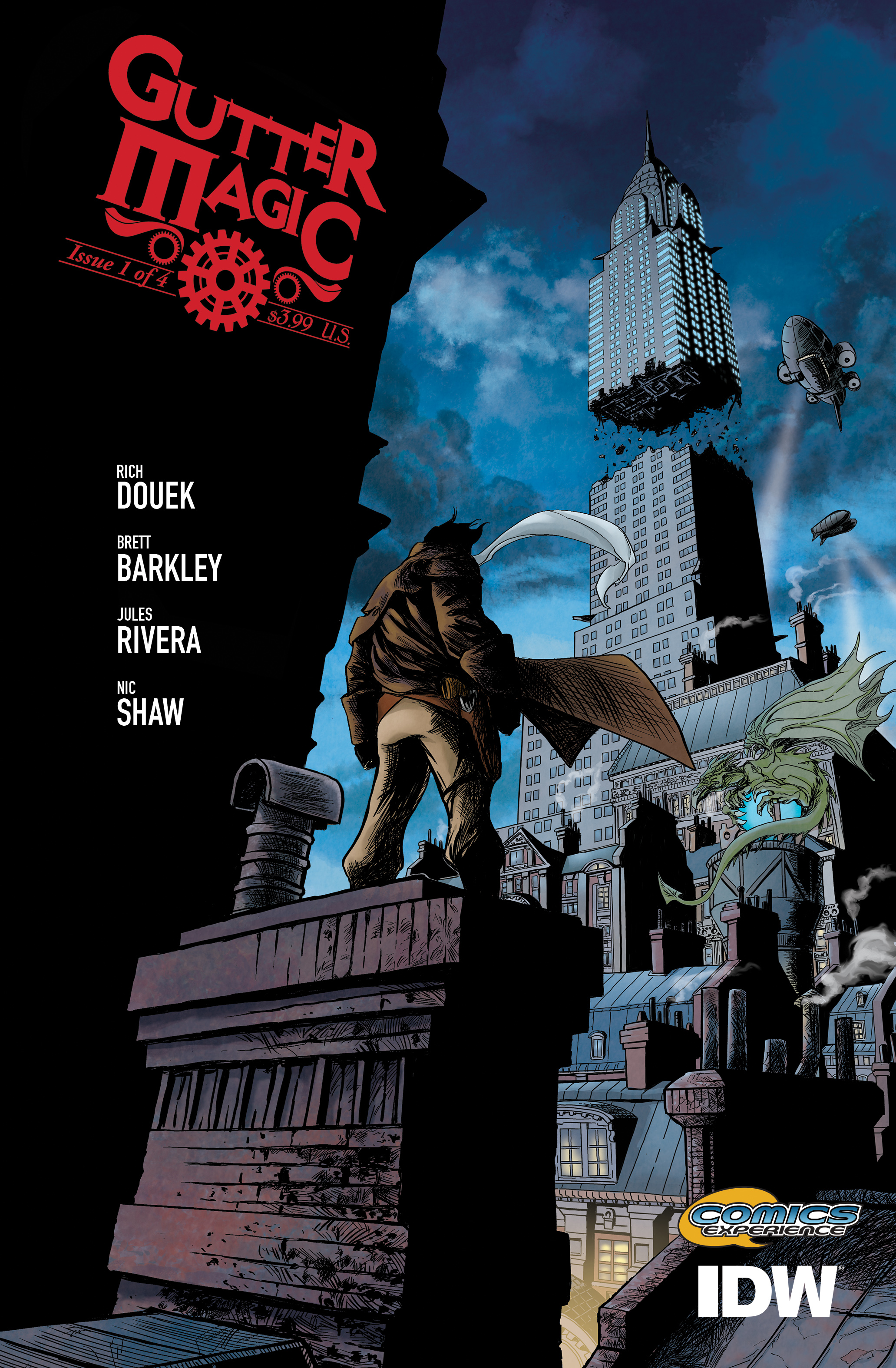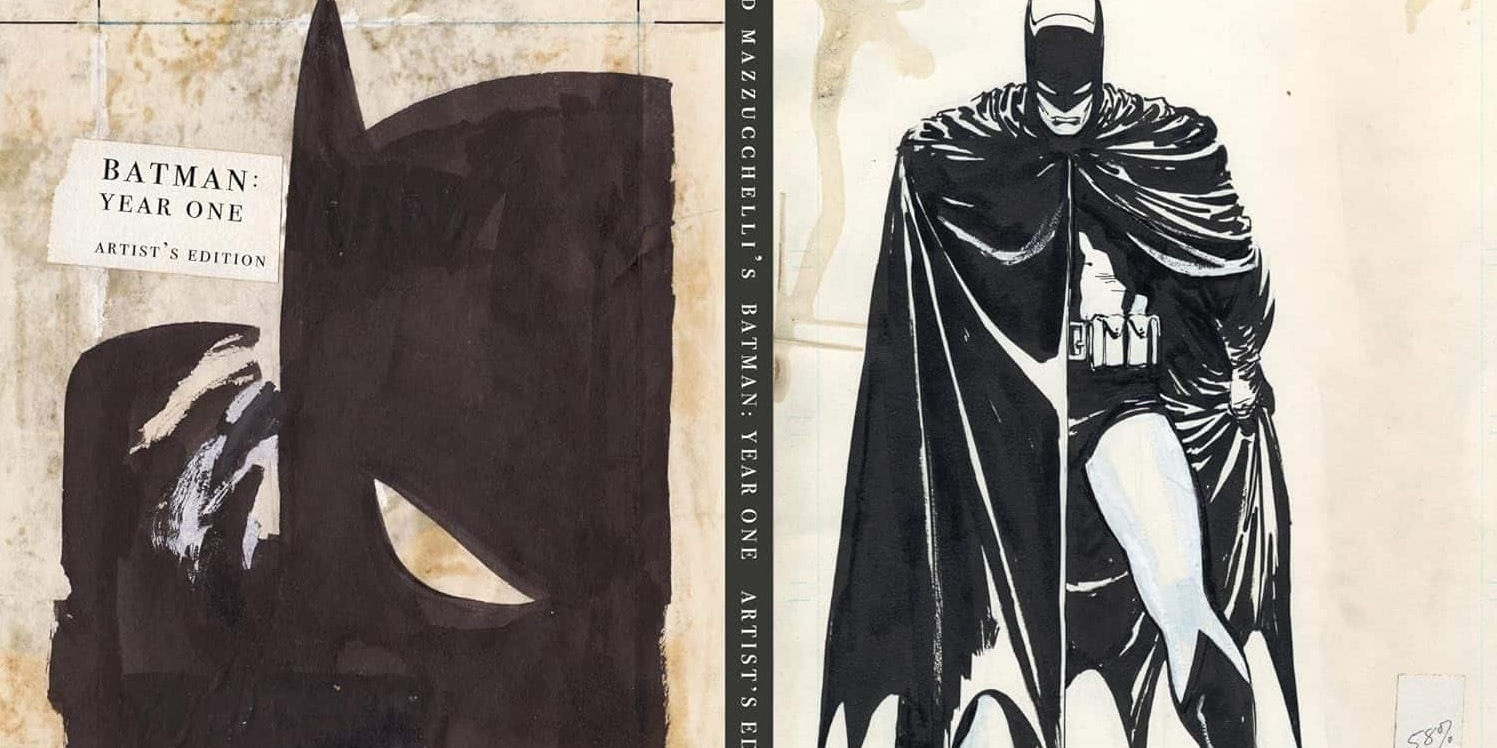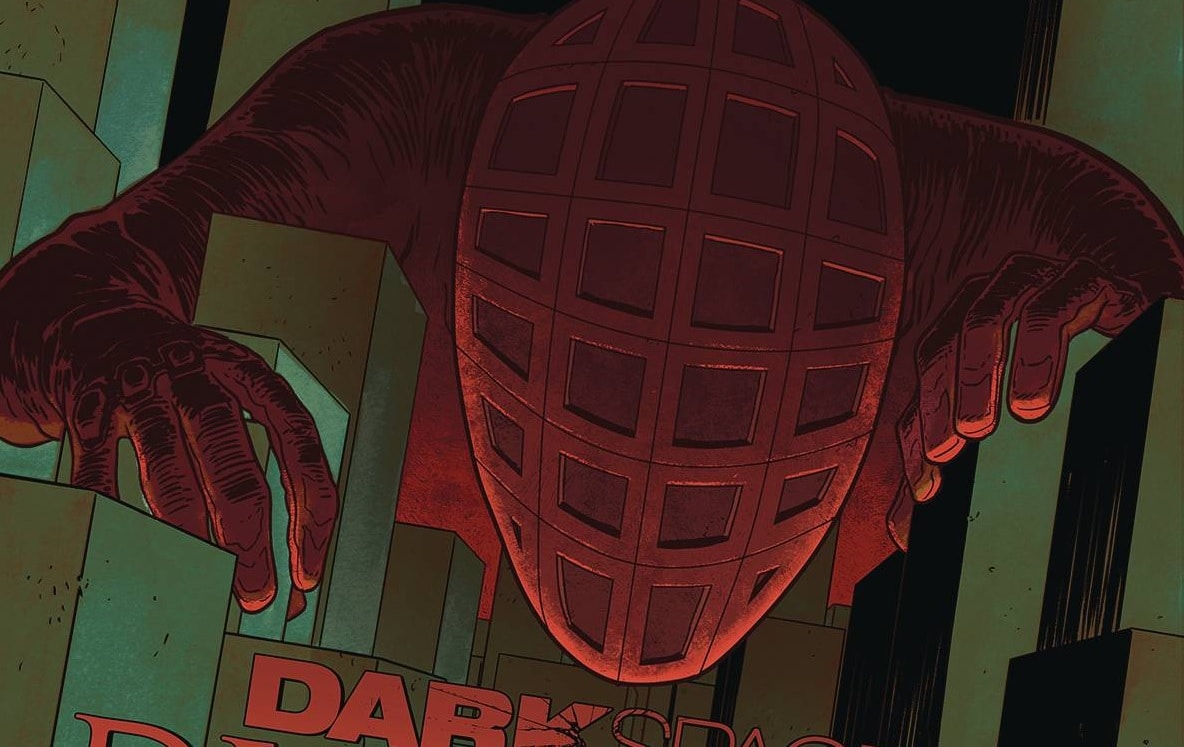A lot of authors have big stories inside of them that involve a lot of mythology and worldbuilding. The problem in comics is that most series have a relatively low page count, so the majority of writers end up with their 100-issue epics cut short. Rich Douek has created a story with a complex world, but he fit a complete narrative into a tight five issues. I talked to him about, among other things, his process capturing a larger setting into a shorter story with IDW and Comics Experience’s Gutter Magic.
A career in advertising (print especially) seems like a great preparation for one in comics. How has it taught you to mix words with pictures?
One of the biggest benefits as far as writing goes, for me, has been working with deadlines. It’s not even the tightness of the deadlines, really, it’s just the fact that the project needs to get done by a certain date, which means there’s a point where I have to put it down and send it out. One of my biggest issues with writing used to be that I revised my work so much, I never finished anything. Working with deadlines cured me of that.
Another benefit of working as a writer in advertising is learning how to partner with visual artists, and communicate well with them. Every ad I work on is a team effort between myself, an art director, illustrators, designers, and even with account executives and other behind-the-scenes business people. What that’s really taught me is how to collaborate well, and work as a creative team.
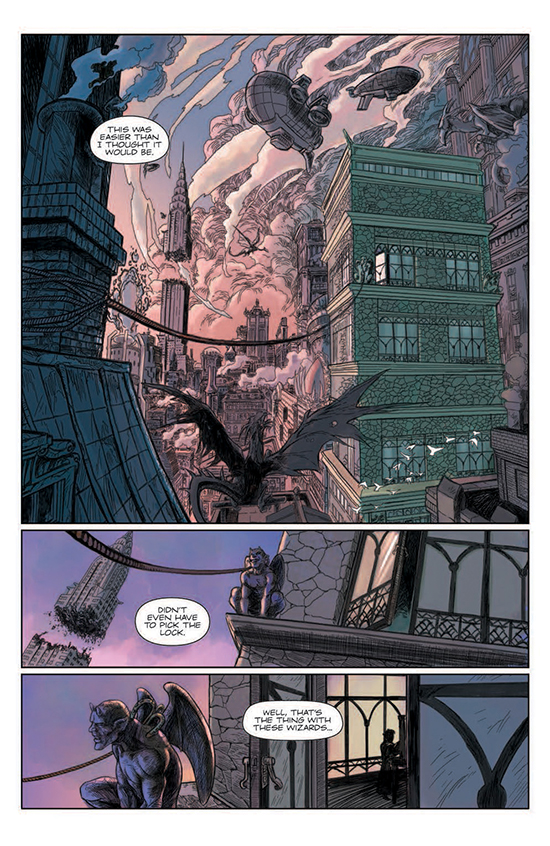
What’s the elevator pitch for Gutter Magic?
Well, in my best movie trailer guy voice, I’d say; In a world where magic replaced technology during WWII, Cinder Byrnes struggles to become a wizard. He’s lied, cheated and stolen every scrap of magical power he can, and needs to figure out how to use it before the people he’s stolen it from come to collect.
Genre-wise, it’s a fun mix of urban fantasy, pulp adventure, and crime fiction.
It feels like a comic that has a lot of backstory. How long have you been building the world of Gutter Magic?
I’ve been working on it in one form or another for years – sometimes in prose, sometimes in script form – and over the years I’ve developed quite a bit of backstory, from the rules of how magic works, to the reasons why the society depicted has developed the way it has. A lot of that comes through in the story, but some of it will probably never see the light of day.
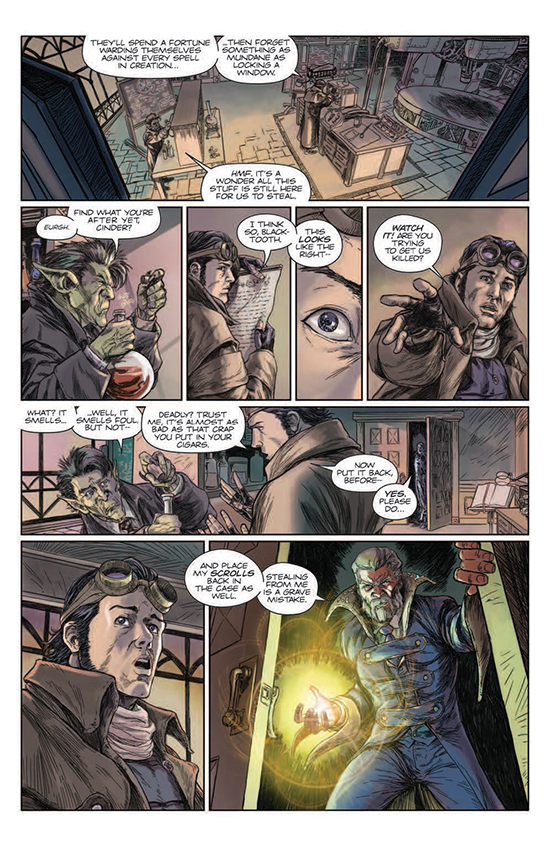
Do you have a series bible?
I don’t have a single document that you could call a series bible. What I do have is about 3 or 4 notebooks full of world-building content. When developing the world, I would just pick a topic and start writing about it, as if I was writing an essay. As time went on, the books filled up, and I got a good sense of how things work. I’ll probably organize it someday and type it up, but right now I’m focused on getting the book out.
Is this series self-contained? Will it feel complete if there’s never a second volume?
The series is definitely self-contained. If I never get to do another Gutter Magic story, it will stand alone as a complete story. That being said, I feel like I could tell stories in this world for a long, long time.
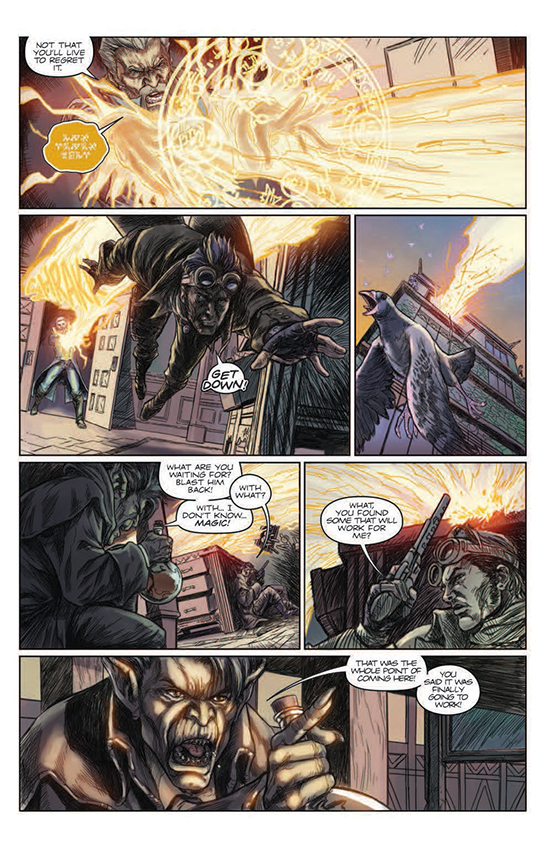
The problem with telling an epic in comic form is that it’s easier for a writer to stick around than an artist. How do you intend to maintain consistency with the art?
Probably the most important element is having strong, recognizable designs. If you lay the groundwork with very strong character and environmental designs, they can survive a wide range of style changes while still being recognizable and consistent. One of my favorite examples of what I’m talking about is Hellboy. Mignola’s designs are so strong that you can do a books like the Hellboy Weird Tales volumes – where you have various short stories that could not be more different style-wise, yet they all feel like authentic Hellboy stories.
Given that it’s set in a world that’s very much already realized, how do you give the art team a sense of ownership over the work? I think the double page spread of the chase effectively did that, but what other steps do you take?
I think one of the ways to get the best out of people is to give them the freedom to make the artistic choices that they feel will work the best. So what I try to concentrate on when I collaborate is being clear in what my intentions with a scene or character are, and provide enough background as I can, so my creative partners can make those choices confidently.
So that leads to a lot of back and forth discussion over and above what’s on the page in the script. Whether it’s talking about a specific scene, or a general worldbuilding “rule”, communication and discussion is probably the most important thing you can do.
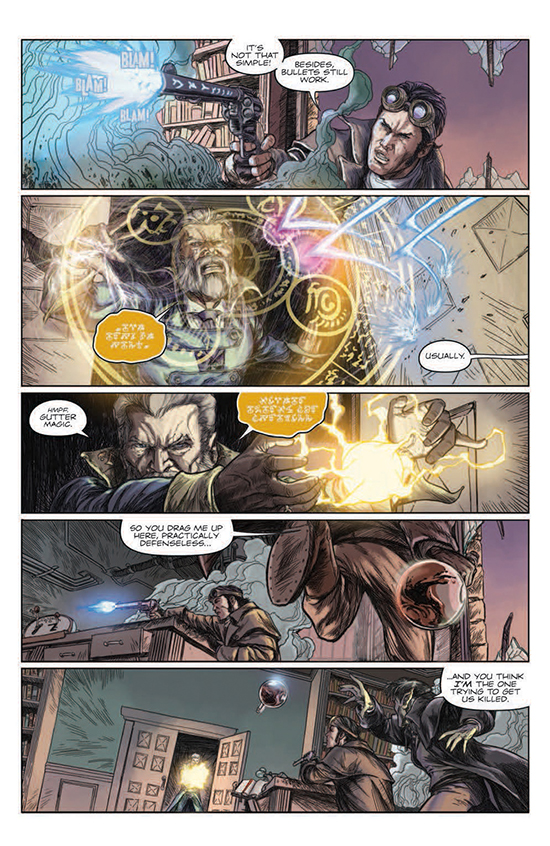
What do you do if the miniseries doesn’t take off? Continue the comic anyway? Move on in novel form? Something else?
If the miniseries doesn’t take off, I’ll move on to the next project, and the next, and the next after that. I love Gutter Magic dearly, but it’s one of many stories I want to explore.
There’s no question that I want it to be successful, but if it’s not, and it doesn’t find an audience this time around, I will hopefully be able to revisit it at some point, if I have some success with another title.
What benefits do the Comics Experience and IDW label have?
Comics Experience is a really unique place – it’s an incredibly supportive community of professional and aspiring comics creators, and I can honestly say this book would not have happened without it. When I first joined I had no idea how to approach writing a comic script, or get a comic produced. By the end of my first class there, I had a short project ready to go, and just kept going from there.
IDW also deserves a lot of credit for supporting new voices in comics, like the team on this book, and the rest of the books put out by the imprint. With so many great books out there, it’s hard for publishers to take a chance on new properties, much less new creators. I’m really grateful that IDW felt Gutter Magic was of high enough quality to put their logo on the cover.
How big of an impact on sales do you think a publisher has versus the creative team?
I think it’s hard to draw a distinct line, because everyone brings something to the table. I think that for newer creators like myself, and the rest of the creative team, publishing with IDW gives us a reach that we wouldn’t be able to achieve on our own. We have a full page ad in the front of Previews magazine, which we wouldn’t have been able to get otherwise, so obviously, there’s a huge benefit.
However, and maybe this goes back to my advertising background, even the biggest ad in the world won’t be effective without a great product – so the hope is that all the work we’ve put into the book will show through and connect with retailers and customers.
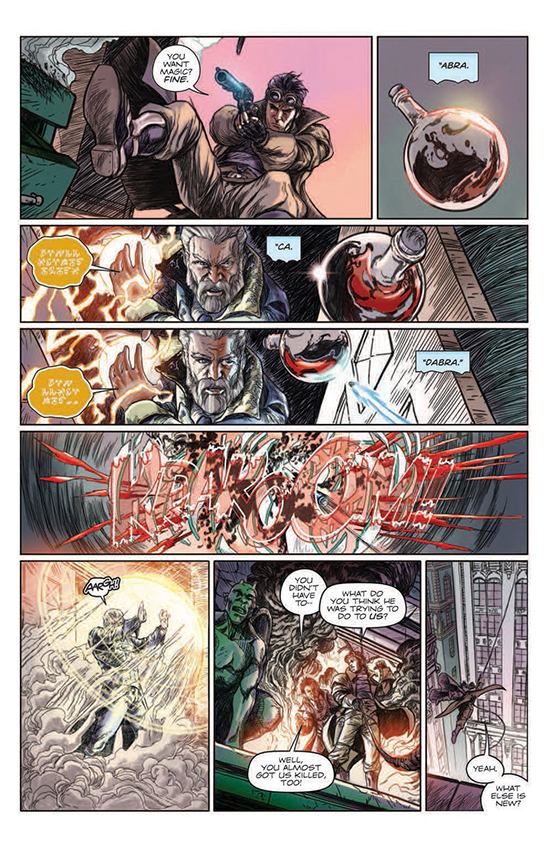
As someone who’s relatively unknown in the industry, how are you going to get the word out?
I’m doing a lot of legwork on my own, reaching out to sites and stores to see who might be interested in checking the book out. Which means a lot of phone calls, and a lot of emails, and I don’t think that necessarily gets any easier as you get more well known, unless you get to the point where you can hire a publicist to do it for you.
I’m also leaning on some seasoned pros that I’ve become friendly with since I’ve started making comics. I feel a little guilty sometimes, asking people who I know are busy to take time to help me out, but guys like Charles Soule, Justin Jordan, Jim Zub, Frank Barbiere, Cullen Bunn, Declan Shalvey, Chris Sebela and Tyler James have all been amazingly supportive, and come through with pull quotes, tweets, and just general encouragement whenever I’ve needed it. It’s another thing that I’m truly grateful for.
They say that it’s harder to stay in comics than break into it. How are you going to stick around?
When I got my first copywriting gig, I went into my new boss’ office to say thank you. He told me “Getting the job was the hard part. Now you all you need to do is be great.”
What I think he meant by that was that I already had great ideas – it’s why I got the gig in the first place. What I had now was a platform to bring those ideas, and new ones, to life. And as long as I took advantage of the opportunity, and held myself and my work to a certain standard, keeping the job would be easy.
Now, that’s advertising, and this is comics, but I feel like if I keep pushing myself to put out great work, create new stories, and new worlds, I’ll do just fine.
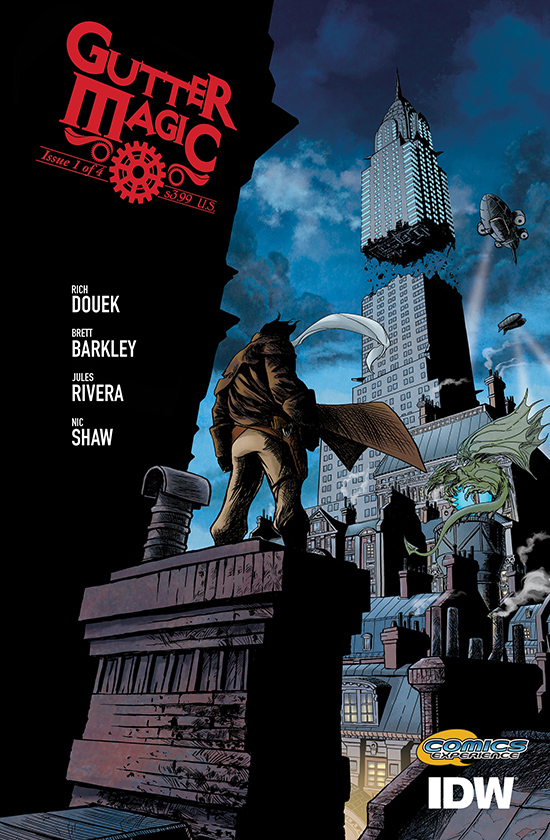
Find Rich on Twitter and Tumblr. Gutter Magic #1 comes out on January 20th. Preorder it from IDW with the order code NOV150341 for the regular cover and NOV150342 for the variant.


